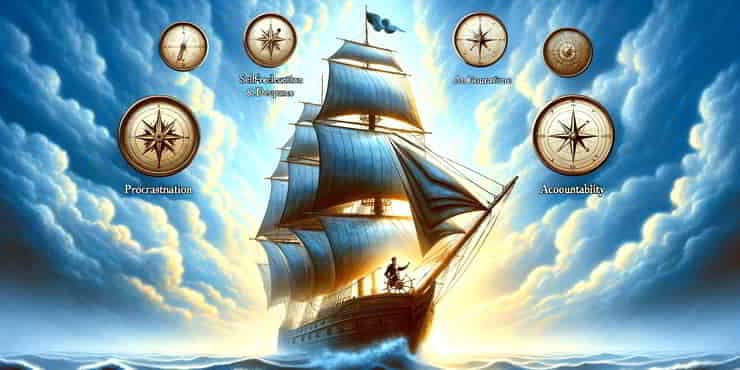Self-Reflection And Self-Accountability: Essentials For Productivity

Estimated reading time: 5 Min
Self-reflection and self-accountability are not mere buzzwords; they are the essence of what it takes to succeed at work and life with purpose and efficiency.
Imagine the grand ship “Productivity” navigating the boundless ocean of work and ambitions. This ship, sturdy and eager, is every bit capable of reaching dazzling new horizons.
Yet, without a compass (self-reflection) and a steadfast captain (accountability) at the helm, it’s all too easy for it to drift off course, becoming lost in the fog of procrastination and inefficiency.
They are the tools that, when wielded with care and intention, can significantly amplify one’s productivity, guiding you to living a life of purpose.
The Role of Self-Reflection in Productivity
Understanding Self-Reflection
In the world of personal and professional growth, self-reflection acts as the mirror that allows us to see ourselves in our true form.
Much like glancing in a mirror before stepping out, self-reflection can help us recognise our strengths and acknowledge our flaws.
It’s a moment of honesty, where we can stand before ourselves and assess what we see without judgement but with a clear eye towards improvement.
Benefits of Self-Reflection for Productivity
- Identifying strengths and weaknesses
Imagine, for a moment, a gardener who knows precisely which of his plants thrive under the sun and which wither in its heat. Similarly, understanding our own professional strengths and weaknesses allows us to navigate our workload more efficiently, playing to our strengths and bolstering our weaknesses. - Goal setting and progress tracking
Setting goals and tracking progress is akin to planting signposts along the road. They offer direction and a measure of how far we’ve travelled, reminding us of our destination and encouraging us to keep moving forward.
Practical Tips for Incorporating Self-Reflection into Daily Routine
- Keeping a journal
Much like drawing a map of your daily travels, maintaining a journal offers a tangible record of where you’ve been, the challenges you’ve faced, and the victories you’ve celebrated. It’s a space for honest self-assessment and reflection. - Time for reflection
Allocating quiet moments for contemplation can be likened to taking scenic stops on a road trip. It’s about pausing to appreciate the journey, reassess your path, and make necessary adjustments to ensure you reach your destination.
The Power of Self-Accountability in Enhancing Productivity
Understanding Self-Accountability
Accountability, in both personal and professional realms, is the crew that keeps the ship steadfastly navigating towards its destination. It’s the external force that reminds us of our commitments and helps us stay on course, even when the waters get rough.
Benefits of Accountability for Productivity
- Motivation and commitment
Just as having a workout partner can keep you committed to your gym routine, having someone to whom you’re accountable can significantly bolster your motivation to stick with your tasks and goals. They’re the cheerleaders on the sidelines of your professional marathon. - Feedback and perspective
External viewpoints can illuminate our path in ways we might not see on our own, much like a lighthouse offering guidance to ships navigating through treacherous waters. They provide new insights, challenge our assumptions, and encourage growth.
Building a Culture of Accountability
- Personal accountability strategies
Setting personal benchmarks and rewards is akin to striving for personal bests in sports. It’s about challenging yourself to reach new heights and rewarding yourself when you do. - Finding accountability partners
The role of mentors, colleagues, or friends in our journey towards productivity cannot be understated. Like teammates in a sports game, they support us, challenge us, and celebrate with us, making the journey not just bearable but enjoyable.
Strategies for Merging Self-Reflection and Self-Accountability
Integrating the Two for Maximum Productivity
The true artistry in enhancing productivity lies in the seamless weaving together of self-reflection and self-accountability.
When these elements combine, they form a powerful sail that catches the winds of ambition and drives the ship forward.
- Daily and weekly reviews
Picture a captain and their crew huddled around a chart, reviewing their journey thus far and plotting the course ahead. Similarly, incorporating both self-reflection and accountability into daily and weekly reviews allows for a comprehensive assessment of progress. It’s time to ask oneself, “What have I learned? What can I improve? How can I adjust my course to reach my destination more effectively?” It’s also the moment for accountability partners to weigh in, offering their insights and encouragement. - Setting up systems and routines that encourage both practices
Designing a productivity workflow that naturally incorporates moments for self-reflection and mechanisms for accountability is akin to setting the sails of a ship for optimal wind catch. This might involve setting specific times for reflection, using apps or tools for tracking progress, and scheduling regular check-ins with accountability partners.
Case Studies and Examples
- Consider the story of a project team that implemented weekly reflection sessions and accountability meetings. These sessions allowed them to identify bottlenecks early, leverage individual team members’ strengths more effectively, and adjust their strategy in real-time, leading to a 30% increase in project delivery efficiency.
- Reflect on the journey of a freelance writer who, by setting daily word count goals and having a mentor to report to, was able to double their output and improve the quality of their work within six months.
Lessons learned
From these stories, we learn that the path to heightened productivity is paved with the stones of self-awareness and the mortar of mutual support.
Like sailors learning from the journeys of those who navigated before them, we can draw inspiration and practical advice from these examples to chart our own course.
Summary
As we consider the concepts of self-reflection and self-accountability as cornerstones of productivity, let’s see what we’ve learned.
We’ve seen how these practices, much like the compass and the crew of a ship, help guide us through the vast ocean of work and ambition.
They ensure that we stay true to our course, make necessary adjustments, and sail towards the horizon of our goals with purpose and determination.
Now, I invite you, to embark on your own journey of self-discovery and self-accountability.
Remember, even the most seasoned sailors were once novices, learning to navigate the stars and the seas.
So, set your compass, gather your crew, and sail forth into the vast, uncharted waters of your productivity potential. The treasures awaiting you just beyond the horizon are worth every bit of effort.
In this narrative, we’ve journeyed together through the intertwined realms of self-reflection and self-accountability, uncovering their indispensable role in productivity.
So, what have I missed? What would you like to discuss? Please use the comments and share.
🙂
Richard
Further Reading/Resources
For those eager to dive deeper into the seas of productivity, here are a few resources to chart your course:
- “Atomic Habits” by James Clear for building systems that foster productivity.
- “The Effective Executive” by Peter F. Drucker for insights on efficiency and decision-making.
- “Mindset: The New Psychology of Success” by Carol S. Dweck for understanding the growth mindset that underpins continual improvement.
- Productivity apps like Trello, Asana, and Reflectly can help in setting goals, tracking progress, and encouraging reflection






